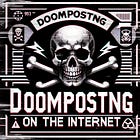Thoughts on Smith's "Death of the Internet"
Is the internet dying? And if so, what's killing it?
I tend to be an optimist about most things, including the internet.
This is unusual among culture/technology writers. For a variety of reasons, this crowd tends to attract negative voices. If you read Today In Tabs, Culture Study, Garbage Day, After School, Where’s Your Ed At, Galaxy Brain, or any of the other similar newsletters you’ll quickly realize two things. First, the field leans so heavily to the left it’s practically toppling over. “Enthusiastic Democrat who embraces Joe Biden” is the right-most political stance you will find among your dozens of newsletters. And second, there’s a persistent theme that everything on the internet sucks. The social media sites are all terrible now. Big companies are strangling what is good and pure. We’re being crushed by technology, AI, disinformation, propaganda, etc. The social web used to be good but now it’s shit. We’re all screwed and we live in a time of inevitable doom from climate change, racism, fascism, capitalism, etc.
I spend a lot of time trying to counter this narrative - at times, I feel like I might be the only optimistic person on this beat. It’s not necessarily wrong to be pessimistic, but if you’re only ever reading pessimistic news you’ll have an incomplete or biased view of the world. This is also one of my differentiating factors - analysis of the social internet and online trends, but without left-poisoned doom vibes.
It’s why a lot of my pieces directly push back on this trend. The Age of Doom counters the relentless doomism that pervades so much of social media. Ugh, Capitalism pushes back on lazy claims that ‘capitalism’ is blame for everything that makes you mad. Things Were Better When Things Were Worse takes aim at unearned nostalgia bait. Et cetera, et cetera.
All this is to say that when bloggers talk about how ‘the internet is dying’, my first instinct is to roll my eyes and call them dramatic edgelords. But that is the trend! There sure are a lot of people calling the internet dead, so I think it’s worth putting together in detail my thoughts on Dying Internet commentary. To do that I’m going to use one of the better versions of the ‘Dying Internet’ posts as a foil - Noah Smith’s recent post The death (again) of the internet as we know it.
Smith believes the public internet is splintering apart, or ‘dying’. In his narrative the internet already died once in the 2010s, when the rise of smartphones and truly global social media turned the internet from the domain of weirdos and enthusiasts to the entire world’s panopticon. Smith sees new movement away from the global reach of Twitter, Instagram, etc:
The internet as we know it has already died once. In the 2010s, the rise of smartphones and mass social media (Twitter/Facebook/Instagram) caused what internet veterans refer to as an Eternal September event, for the entire internet. “Eternal September” is an old slang term for when a bunch of normal folks flood into a previously cozy, boutique online space. When the average person got a high-speed pocket computer that linked them 24/7 to the world of social media, the internet ceased to be the domain of weirdos and hobbyists, and became the town square for our entire society…
Anecdotally, when I meet people in their early to mid 20s, they don’t want to connect over Instagram, Twitter, or Facebook Messenger, like young people did in the 2010s. They just exchange phone numbers, like people did in the 2000s. Everyone is still online all the time, but “online” increasingly means group chats, Discord, and other small-group interactions. As a society, we are re-learning how to center our social lives around a network of people we know in real life, rather than around a performative feed in which we broadcast our actions and thoughts to a bunch of strangers.
I think Smith’s description here is incomplete. With a nod to Gretchen McCulloch, I categorize the social internet’s history into four waves. Those waves can be roughly defined by the first platform you used online:
Wave One: Usenet, IRC, BBS, listservs, etc
Wave Two: AIM, the early blogosphere, LiveJournal, Myspace, etc
Wave Three: Facebook, Twitter, YouTube
Wave Four: Instagram, Snapchat, and everything afterwards
Depending on which of these services you used first, your early experience on the internet was vastly different.1 And each of these era shifts was a genuine upheaval of what the internet was, what it meant to interact with people. If the current era of the internet is ‘dying’, then the social internet has died and been reborn at a minimum of three times already.
Still, I do agree with Smith’s central point. The internet is shifting and changing in important ways. I think we’re on the verge of the 5th internet era, and it’s worth talking about what forces are moving us in that direction.
Smith identifies five key trends that are driving people off the public internet and into more semi-public or private spaces.
Ad-related enshittification
China and Russia
AI slop
Accelerating misinformation
Algorithmic feeds
Let’s run through these in order.
Ad-related enshittification
Noah believes that a lot of sites are getting enshittified, and that for the most part ads are to blame. Google results are clogged up with ads. Quora is a disaster of a website filled with AI and more ads.
In other words, using Google is now akin to a video game, where the challenge is to craft a search query that avoids ad spam and gets you to the well-hidden information that you actually want. That’s not the most fun video game in the world, so when I can I now use ChatGPT (which is not yet enshittified). But ChatGPT doesn’t work for a lot of things, and so I’m stuck playing this awful, boring video game of “dodge the ads”.
What’s more, platforms that depend on Google for their traffic are often very good at SEO these days, and their sites are often enshittified as well. For example, if you type a question into Google, you’ll often get a bunch of links to Quora. A few years back, Quora was a great place to find quick and in-depth answers. As of 2024, however, it is…not.
For Smith, these examples hold true across most of the big social internet sites. As they grow to maturity, pressure to make money increases and they degrade their user experience in the name of profits. Ads have come to dominate everything in ways that make the internet worse.
I think this story is true but incomplete. There are really two stories in online advertising: The story of Meta and Google’s success, and the story of everyone else’s failure.




